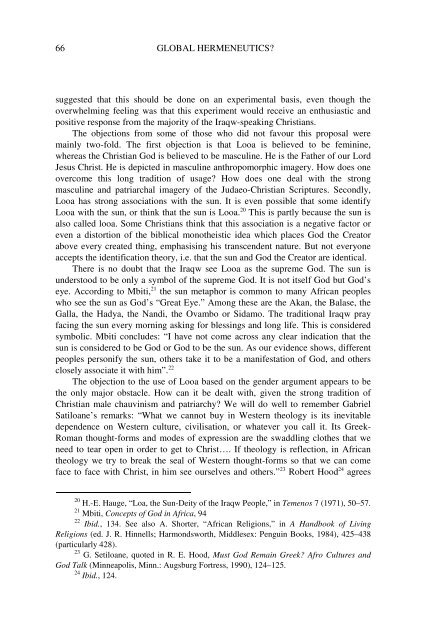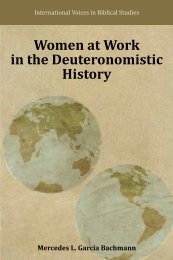Global Hermeneutics? - International Voices in Biblical Studies ...
Global Hermeneutics? - International Voices in Biblical Studies ...
Global Hermeneutics? - International Voices in Biblical Studies ...
You also want an ePaper? Increase the reach of your titles
YUMPU automatically turns print PDFs into web optimized ePapers that Google loves.
66 GLOBAL HERMENEUTICS?<br />
suggested that this should be done on an experimental basis, even though the<br />
overwhelm<strong>in</strong>g feel<strong>in</strong>g was that this experiment would receive an enthusiastic and<br />
positive response from the majority of the Iraqw-speak<strong>in</strong>g Christians.<br />
The objections from some of those who did not favour this proposal were<br />
ma<strong>in</strong>ly two-fold. The first objection is that Looa is believed to be fem<strong>in</strong><strong>in</strong>e,<br />
whereas the Christian God is believed to be mascul<strong>in</strong>e. He is the Father of our Lord<br />
Jesus Christ. He is depicted <strong>in</strong> mascul<strong>in</strong>e anthropomorphic imagery. How does one<br />
overcome this long tradition of usage? How does one deal with the strong<br />
mascul<strong>in</strong>e and patriarchal imagery of the Judaeo-Christian Scriptures. Secondly,<br />
Looa has strong associations with the sun. It is even possible that some identify<br />
Looa with the sun, or th<strong>in</strong>k that the sun is Looa. 20 This is partly because the sun is<br />
also called looa. Some Christians th<strong>in</strong>k that this association is a negative factor or<br />
even a distortion of the biblical monotheistic idea which places God the Creator<br />
above every created th<strong>in</strong>g, emphasis<strong>in</strong>g his transcendent nature. But not everyone<br />
accepts the identification theory, i.e. that the sun and God the Creator are identical.<br />
There is no doubt that the Iraqw see Looa as the supreme God. The sun is<br />
understood to be only a symbol of the supreme God. It is not itself God but God’s<br />
eye. Accord<strong>in</strong>g to Mbiti, 21 the sun metaphor is common to many African peoples<br />
who see the sun as God’s “Great Eye.” Among these are the Akan, the Balase, the<br />
Galla, the Hadya, the Nandi, the Ovambo or Sidamo. The traditional Iraqw pray<br />
fac<strong>in</strong>g the sun every morn<strong>in</strong>g ask<strong>in</strong>g for bless<strong>in</strong>gs and long life. This is considered<br />
symbolic. Mbiti concludes: “I have not come across any clear <strong>in</strong>dication that the<br />
sun is considered to be God or God to be the sun. As our evidence shows, different<br />
peoples personify the sun, others take it to be a manifestation of God, and others<br />
closely associate it with him”. 22<br />
The objection to the use of Looa based on the gender argument appears to be<br />
the only major obstacle. How can it be dealt with, given the strong tradition of<br />
Christian male chauv<strong>in</strong>ism and patriarchy? We will do well to remember Gabriel<br />
Satiloane’s remarks: “What we cannot buy <strong>in</strong> Western theology is its <strong>in</strong>evitable<br />
dependence on Western culture, civilisation, or whatever you call it. Its Greek-<br />
Roman thought-forms and modes of expression are the swaddl<strong>in</strong>g clothes that we<br />
need to tear open <strong>in</strong> order to get to Christ…. If theology is reflection, <strong>in</strong> African<br />
theology we try to break the seal of Western thought-forms so that we can come<br />
face to face with Christ, <strong>in</strong> him see ourselves and others.” 23 Robert Hood 24 agrees<br />
20<br />
H.-E. Hauge, “Loa, the Sun-Deity of the Iraqw People,” <strong>in</strong> Temenos 7 (1971), 50–57.<br />
21<br />
Mbiti, Concepts of God <strong>in</strong> Africa, 94<br />
22<br />
Ibid., 134. See also A. Shorter, “African Religions,” <strong>in</strong> A Handbook of Liv<strong>in</strong>g<br />
Religions (ed. J. R. H<strong>in</strong>nells; Harmondsworth, Middlesex: Pengu<strong>in</strong> Books, 1984), 425–438<br />
(particularly 428).<br />
23<br />
G. Setiloane, quoted <strong>in</strong> R. E. Hood, Must God Rema<strong>in</strong> Greek? Afro Cultures and<br />
God Talk (M<strong>in</strong>neapolis, M<strong>in</strong>n.: Augsburg Fortress, 1990), 124–125.<br />
24<br />
Ibid., 124.




